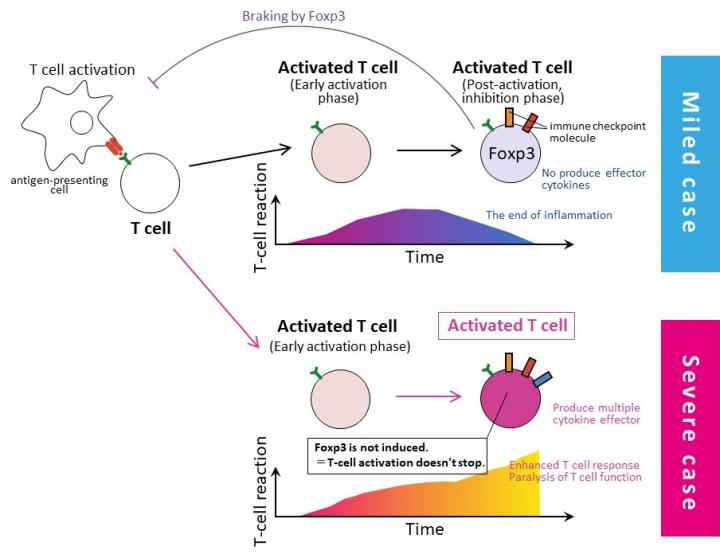
Credit: Associate Professor Masahiro Ono
There is an idea within the coronavirus research field that there is some kind of T cell abnormality in critically ill COVID-19 patients, but specific details have not yet been clarified. To shed light on the problem, a research collaboration based in Kumamoto University (Japan) has performed a genetic analysis of T cells from lung tissue of COVID-19 patients. Their work revealed abnormalities in T cells that resulted in overactivation that may cause severe pneumonia. The researchers believe that their findings will lead to new ways of avoiding severe pneumonia caused by coronavirus infections.
COVID-19 continues to have an enormous impact on daily lives. Why some people become severely ill while the majority of those infected are asymptomatic or very mildly ill is still a major unanswered question. Risk factors for severe disease include old age, diabetes, obesity, and hypertension. We also know that critically ill patients experience an increase in inflammation factors (inflammatory cytokines) and immune system overreaction, whereas the number of T cells, the “command centers” for immune cells, is significantly reduced in the blood. However, the medical implications of these findings are still unclear.
T cells regulate the activity of the immune system by recognizing specific viruses. They also play important roles in virus elimination and the acquisition of immunity. In this study, researchers focused on T cells to determine the causes of severe pneumonia in COVID-19. CD4+ T cells (helper T cells) work to eliminate viruses from the body by promoting the maturation and activation of cytotoxic T cells, which attack virus-infected cells, and B cells, which produce antibodies. On the other hand, when some CD4+ T cells become highly activated, they express the transcription factor FoxP3 and become regulatory T cells which then act as brakes to inhibit T cell responses. This research analyzed genetic data from bronchoalveolar lavage fluids from lungs of patients with COVID-19 from Wuhan, China to characterize the activity and genetic characteristics of the CD4+ T cells present.
Using state-of-the-art bioinformatics techniques, they found that while T cells were markedly activated in the lungs of patients with severe pneumonia, the induction of FoxP3 was inhibited and the T cell braking function stopped working. While T-cell activities are usually balanced between accelerating and braking, one of the most important brakes was not functioning in severe COVID-19 which may have led to severe pneumonia.
“This study has clarified the association between severe pneumonia and T cell abnormalities. We expect that these findings will lead to a better understanding of the mechanisms of severe pneumonia in patients with COVID-19,” said study leader, Associate Professor Masahiro Ono. “A more detailed understanding of the pathogenesis based on this research may contribute to the development of drugs to prevent the development of severe COVID-19 and to diagnose the risk of severe disease.”
###
This research was published online in Frontiers in Immunology on 8 October 2020.
Source:
Kalfaoglu, B., Almeida-Santos, J., Tye, C. A., Satou, Y., & Ono, M. (2020). T-Cell Hyperactivation and Paralysis in Severe COVID-19 Infection Revealed by Single-Cell Analysis. Frontiers in Immunology, 11. doi:10.3389/fimmu.2020.589380
Media Contact
J. Sanderson, N. Fukuda, C. Chen
[email protected]
Related Journal Article
http://dx.




